Ge Refrigerator Sounds Like Airplane? Silence it Now!
We may earn affiliate fees for purchases using our links (at no additional cost to you).
Is your GE refrigerator producing a peculiar sound that resembles an airplane taking off? Many homeowners have experienced this puzzling phenomenon.
This article explores the reasons why your GE refrigerator sounds like an airplane and the possible solutions.
Fasten your seatbelts and join us as we uncover the mystery behind these airborne sounds.
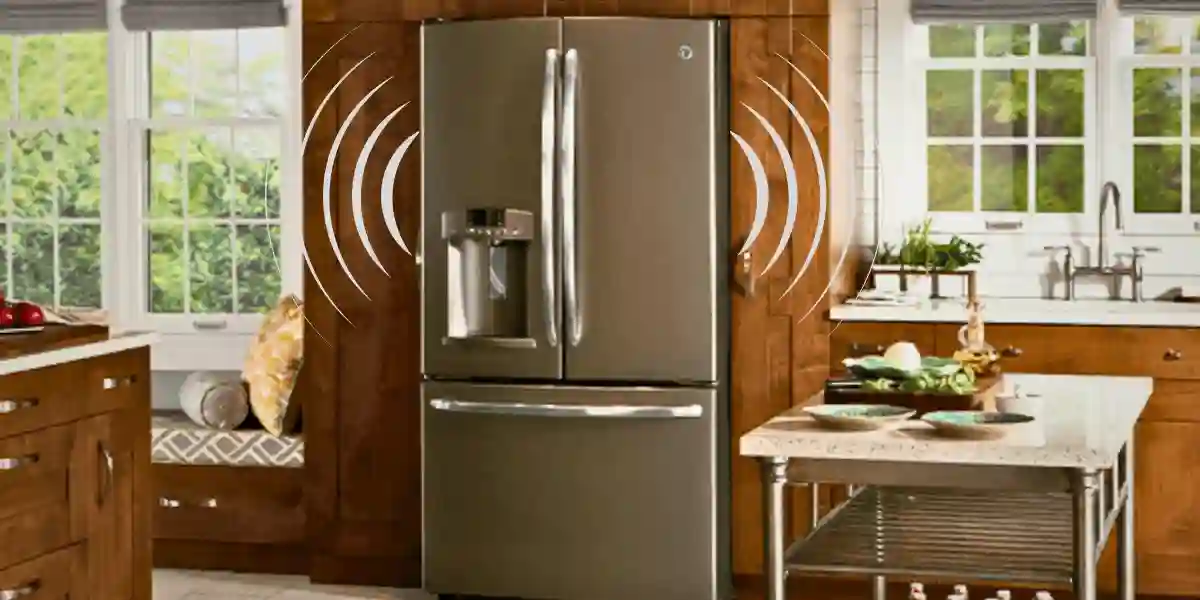
How Come My GE Refrigerator Sounds Like an Airplane?
An airplane-like sound from your GE refrigerator could indicate a problem. Here are a few possible reasons for the loud noise:
Issues with condenser fans:
The condenser fan is responsible for cooling the refrigerator’s compressor. If the fan becomes dirty, damaged, or malfunctions, it may produce loud noises. Cleaning or replacing the fan might resolve the issue.
Evaporator Fan Problems:
The evaporator fan circulates air within the refrigerator to maintain consistent temperatures.
A defective motor or blade can cause unusual sounds from a fan. Inspecting and repairing or replacing the evaporator fan may be necessary.
Compressor Troubles:
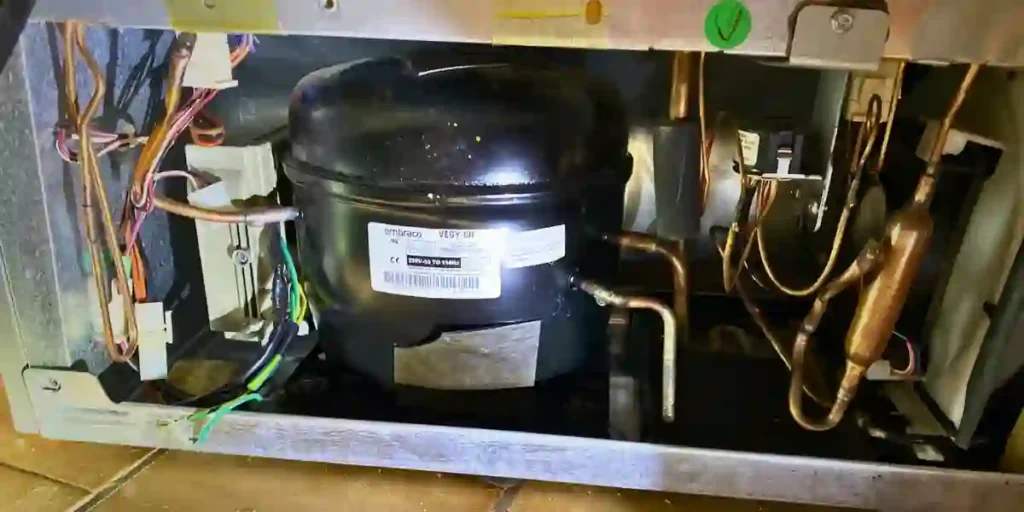
The compressor is a crucial component that maintains the cooling process. A malfunctioning or worn-out compressor might produce loud noises, including high-pitched ones.
Professional assistance is typically required to diagnose and repair compressor issues.
Loose Components:
Vibrations can cause various components within the refrigerator to become loose over time.
Loose screws, panels, or coils can create rattling or buzzing noises. Carefully examining and tightening any loose components may resolve the problem.
Ice or Frost Buildup:
An excessive accumulation of ice or frost can interfere with the refrigerator’s normal operation.
If your freezer or evaporator coils have ice buildup, defrosting the unit might help.
How to Identify and Diagnose the Source of the Noise?
To identify and diagnose the source of the noise in your GE refrigerator, you can follow these steps:
Location of the Noise:

Try to pinpoint the exact location of the noise. Is it coming from the inside of the refrigerator or the back?
Determining the general area will help narrow down the possible causes.
Type of Noise:
Pay attention to the type of noise you’re hearing. Is it grinding, buzzing, rattling, whistling, or any other specific sound?
Different types of noises can indicate different problems.
Check the Condenser Fan:
Start by inspecting the condenser fan, located at the back of the refrigerator. Ensure it is clean and free from any debris.
Gently spin the fan with your hand to check if it rotates smoothly. If there are any obstructions or the fan is damaged, it may need to be cleaned or replaced.
Examine the Evaporator Fan:
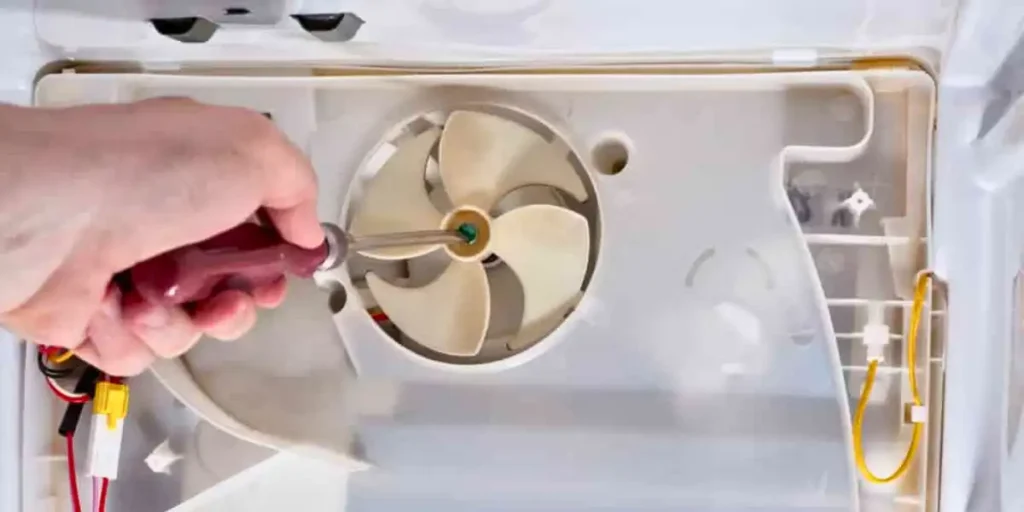
The evaporator fan is typically located inside the freezer compartment. Open the freezer and listen for the noise.
If the noise is coming from this area, the evaporator fan could be the culprit. Check for any obstructions or signs of damage. If necessary, replace the fan motor or blades.
Inspect the Compressor:
The compressor is usually located at the back of the refrigerator. Carefully listen to the sound coming from this area.
If the noise is particularly loud or resembles a mechanical problem, the compressor might be at fault. Contacting a technician may be necessary to resolve compressor issues.
Tighten Loose Components:
Carefully inspect the refrigerator for any loose components, such as screws, panels, or coils. Gently tighten any loose parts to see if the noise diminishes or stops.
Defrosting and Cleaning:
The noise may be caused by ice or frost buildup in the freezer or around the evaporator coils.
Unplug the refrigerator, defrost it completely, and clean any accumulated ice or frost. Once defrosted, plug it back in and observe if the noise persists.
How to Reduce or Eliminate Airplane-Like Sounds in GE Refrigerators?
To reduce or eliminate airplane-like sounds in your GE refrigerator, you can try the following steps:
Clean the Condenser Fan:
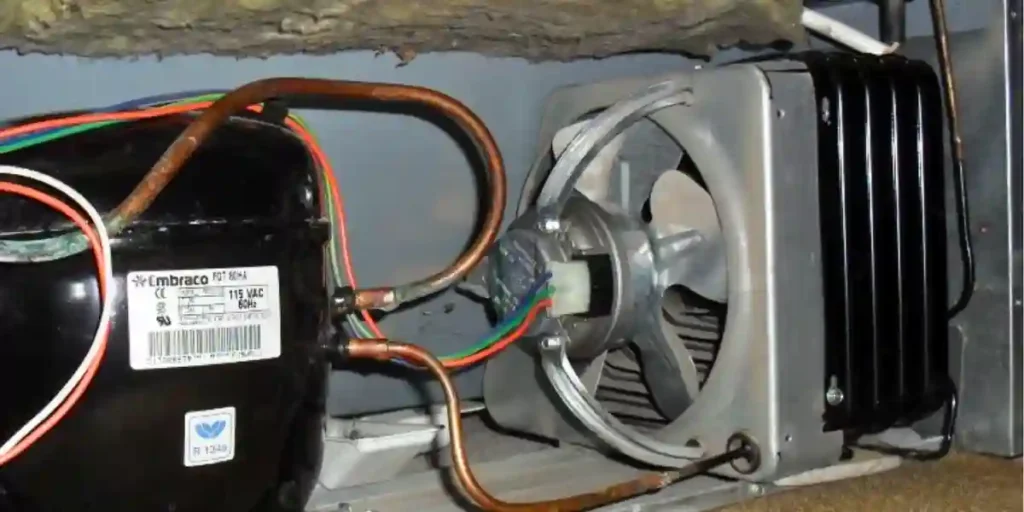
Dust and debris can accumulate on the condenser fan, leading to increased noise levels.
Unplug the refrigerator and locate the condenser fan, usually found at the back of the unit.
A soft brush or a vacuum cleaner with a brush attachment can be used to clean the fan blades. Be careful not to damage any components while cleaning.
Level the Refrigerator:
A refrigerator that is not properly leveled can produce more noise. Use a spirit level to check if your GE refrigerator is balanced.
Adjust the leveling feet or wheels until the refrigerator is stable and evenly balanced.
Check for Loose Components:
Over time, vibrations from the refrigerator can loosen screws, panels, or coils.
Carefully inspect the refrigerator for any loose components and tighten them if necessary. Be cautious not to overtighten, as this can cause damage.
Ensure Proper Ventilation:
An adequate airflow around the refrigerator is essential to its proper operation.
Make sure the refrigerator is placed with sufficient space around it, allowing for proper ventilation.
Check that there are no obstructions blocking the vents or air intake areas on the appliance.
Minimize Overloading:
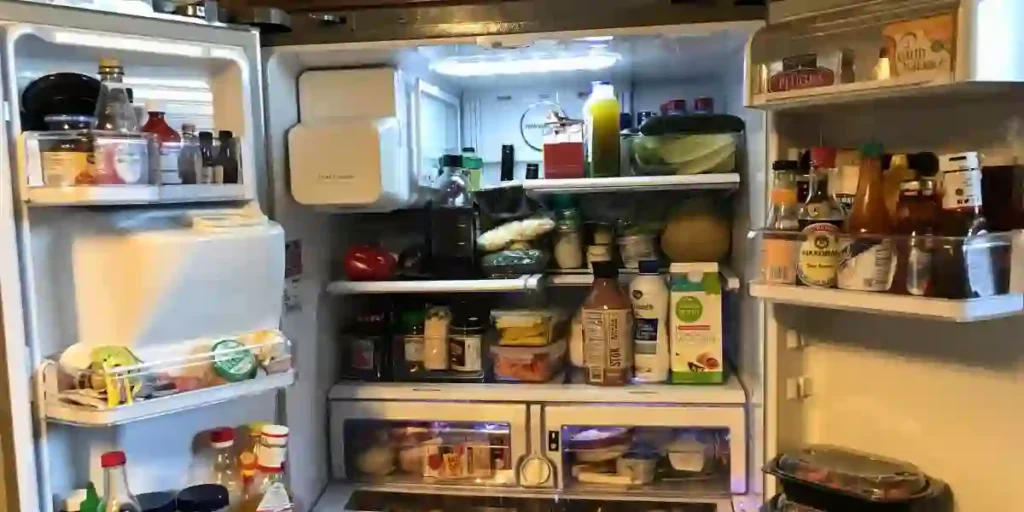
Disorganized refrigerators can create more noise due to overloaded shelves or overloaded items.
Ensure that the refrigerator is not excessively packed, allowing for proper airflow and circulation.
Check the Gasket Seal:
A worn or damaged door gasket can cause air leakage, which makes the refrigerator work harder.
Inspect the gasket seal on the refrigerator door and freezer door for any signs of wear or damage. If necessary, replace the gasket to ensure a tight seal.
Regular Maintenance:
Regular maintenance can help prevent potential issues and reduce noise levels. You can find specific maintenance guidelines in your GE refrigerator’s user manual.
Following these guidelines can help keep the appliance running smoothly and quietly.
Maintenance and Care for a Quieter GE Refrigerator
The following tips will ensure a quieter operation and prolong the lifespan of your GE refrigerator:
Clean the Condenser Coils:
Over time, dust and dirt may build up on the refrigerator’s condenser coil, lowering cooling efficiency.
Regularly clean the condenser coils using a brush or vacuum cleaner with a brush attachment.
Refer to your refrigerator’s user manual for specific instructions on accessing and cleaning the coils.
Keep the Refrigerator Clean:
Regularly clean the interior of the refrigerator, including shelves, drawers, and door seals.
Spills and debris can cause the refrigerator to work harder and produce more noise. Use mild soapy water to clean the interior surfaces, and dry them thoroughly afterward.
Check and Replace the Door Gasket:
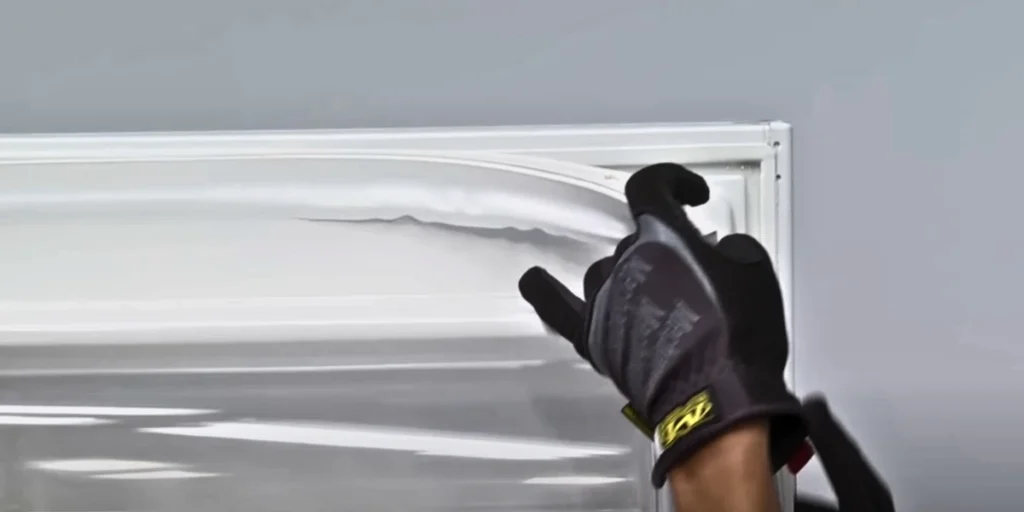
The door gasket forms a tight seal between the refrigerator door and the cabinet. Inspect the gasket regularly for any signs of wear, tears, or damage.
The gasket can wear out or not seal properly, increasing noise and energy consumption.
Replace the gasket if necessary, following the manufacturer’s instructions.
Ensure Proper Ventilation:
For optimal performance and noise reduction, the refrigerator needs adequate airflow.
Place the refrigerator in a location with sufficient space around it to allow for proper ventilation.
Ensure that there are no obstructions blocking the vents or air intake areas of the appliance.
Level the Refrigerator:
A refrigerator that is not level can create vibrations and noise. Adjust the leveling feet or wheels as needed to ensure the refrigerator is stable and balanced on the floor.
Avoid Overloading:
Overloading the refrigerator with too many items can strain the compressor and cause increased noise.
Be mindful of the recommended storage capacity of your refrigerator and avoid overcrowding it. Distribute the items evenly for proper airflow and cooling.
Check and Maintain Seals:

Regularly inspect the seals on the refrigerator and freezer doors. Ensure that they are clean, intact, and free from any debris.
Wipe the seals with a damp cloth to remove any dirt or residues. Properly sealing doors can help reduce noise and improve energy efficiency.
Regularly Defrost (for manual defrost models):
If you have a manual defrost refrigerator, regularly defrost it to prevent excessive ice buildup.
Follow the manufacturer’s instructions for defrosting your specific model. Excessive ice can interfere with proper airflow and cooling, leading to increased noise levels.
Follow the Manufacturer’s Recommendations:
Refer to your GE refrigerator’s user manual for specific maintenance instructions and recommendations.
For optimal performance and quieter operation, follow the manufacturer’s instructions.
FAQs About GE Refrigerator Noises and Solutions
What Can I Do If The Evaporator Fan Is The Source Of The Noise?
Open the freezer compartment, where the evaporator fan is usually located. Carefully inspect the fan for any obstructions, such as ice buildup or debris.
Clean the fan and surrounding area if necessary. A damaged fan blade or motor may require replacing the evaporator fan.
Can Loose Components Contribute To The Noise?
Carefully inspect the refrigerator and tighten any loose components using the appropriate tools. To avoid damaging any parts or causing further problems, tighten carefully.
Should I Defrost My GE Refrigerator To Reduce Noise?
Unplug the refrigerator, remove any perishable items, and allow the ice to melt naturally. Ensure the refrigerator is dry before plugging it back in once it has been defrosted.
This process can restore normal operation and reduce noise caused by ice or frost buildup.
Conclusion
Experience a quieter kitchen with your GE refrigerator by addressing the airplane-like sounds. Clean the condenser coils, maintain proper ventilation, and ensure level placement.
Check and replace faulty fans if needed, while addressing loose components. Defrost when necessary to reduce ice buildup.
Trust professional technicians for compressor-related issues. Take proactive steps to enjoy a peaceful and efficient refrigerator experience.